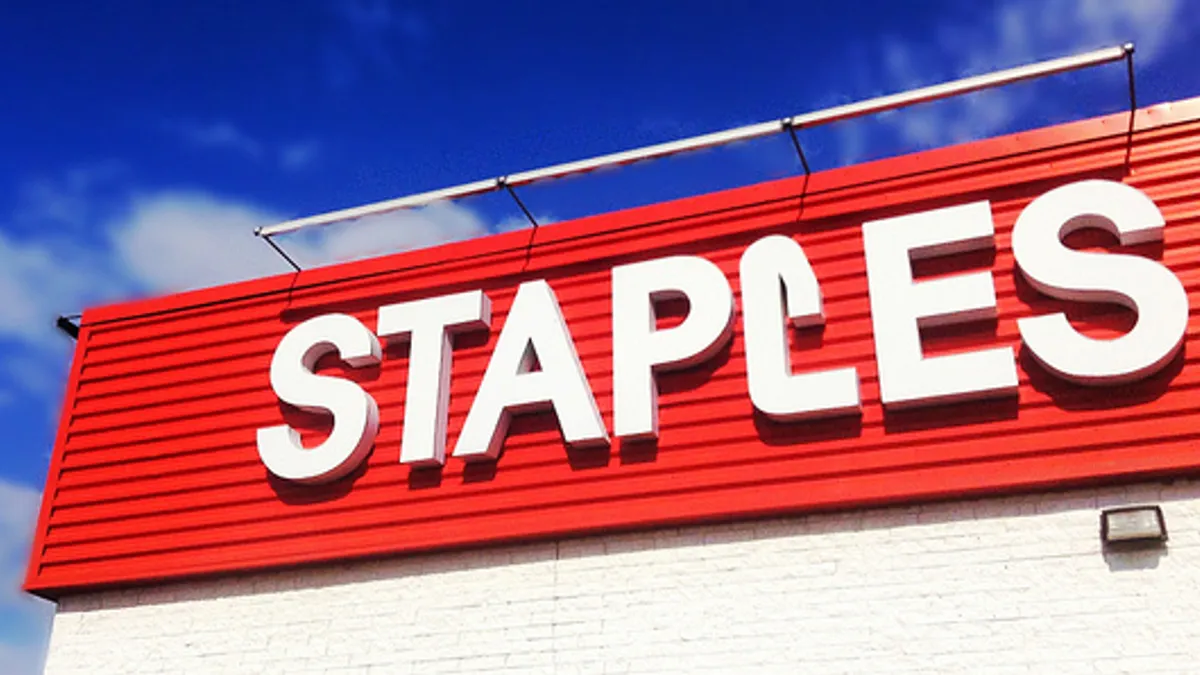Dive Brief:
-
Staples on Thursday reported total company sales in the second quarter fell 3% to $3.9 billion from $4.03 billion in the year-ago period, beating the $3.87 billion FactSet consensus estimate cited by MarketWatch. Same-store sales in the quarter fell 1.1% over last year, according to a company press release, handily besting the FactSet expectation for a 5.1% decline cited by MarketWatch.
-
On a GAAP basis, the company reported Q2 net income from continuing operations of $63 million, or 10 cents per diluted share. Non-GAAP net income from continuing operations of $76 million, or 12 cents per diluted share, meeting FactSet analyst expectations cited by MarketWatch.
-
The Q2 results include pre-tax charges of $10 million primarily related to the proposed acquisition by private equity firm Sycamore Partners; the merger agreement will be taken up by shareholders on Sept. 6, according to a filing with the Securities and Exchange Commission.
Dive Insight:
Staples has been focused on cost-cutting, and its North American Retail with operating loss rate was down 30 basis points from the year-ago quarter. Its business-sales side also fared well in the period, with mid-market sales in Staples Business Advantage, the company’s North American contract business, growing by 11% year-over-year.
With the impending acquisition by Sycamore, those units will both likely evolve, if the private equity firm goes forward with plans to spin off the retail side. While that seems like a logical move, Matt Sargent, senior vice president of retail for Frank N. Magid Associates, told Retail Dive earlier this year that it’s difficult to separate out the value that Staples’ physical stores has to its B2B operations. In other words, cutting off the retail side — which provides a touch point with customers and a distribution advantage — could hurt Staples’ corporate sales.
Staples' B2B unit is also facing heightened competition these days from Amazon, which has been building its own corporate office supplies sales operation as it eyes the high-margins in that space. "I would be shocked if they [Staples] could keep their market share" in the B2B sector, Sargent said. Magid found in survey data that 56% of workplace purchasers had recently bought general office supplies from Amazon. Another 53% had bought technology products and 42% had bought break room and cleaning supplies from the e-commerce giant, according to the firm's data.
More broadly for the industry, Sycamore’s acquisition of Staples shows the bind many publicly traded retailers are in given the current investor climate. Staples executives have been trying for years to find a way to bring sales and profitability up to please investors, including an attempt to buy rival Office Depot, a deal blocked by federal antitrust enforcers. In lieu of a sharp turnaround or large acquisition, the company offered stockholders a buyout.
"Managing the business to pacify shareholders requires short-term focus, which in our view is not only shortsighted but an act of self-sabotage because it sacrifices long-term gain," wrote analysts with ratings firm Moody’s in a June note emailed to Retail Dive. "In our view, this makes Staples’ long-term survival more challenging." Moody’s described the Staples acquisition as a "tipping point" for retailers, which signals that the company believes "the only way to enhance shareholder value is to sell itself to a sponsor — a move that could have ripple effects across retail."
















